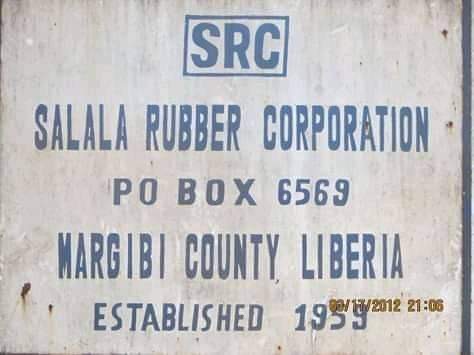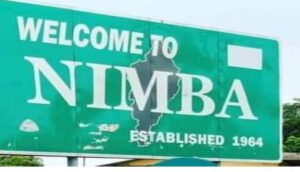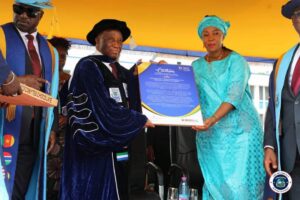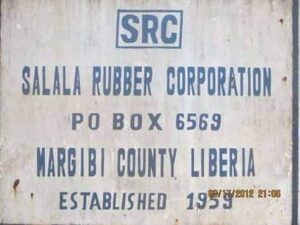“The Untold Truth”; The Real Reasons Behind the Salala Rubber Corporation Shutdown

By: Jeremiah Sackie Cooper. Gmail: jeremiahcooper105@gmail.com
Salala, Bong County: On June 29, 2024, the management of the Salala Rubber Corporation (SRC) abruptly informed its workers about the immediate closure of the company.
According to the management, the official reason for this drastic decision was the violent strike action by employees.
It can be recalled, that on June 27, over 500 tappers, including employees and contractors at Salala Rubber Corporation in Margibi County, launched an indefinite protest against the company.
The protest quickly escalated, destroying several properties. The workers cited severe exploitation and poor labor practices by the SRC management as their reasons for the strike.
Their grievances included the company’s refusal to renovate their housing units, lack of medical services, and demands for subsidized rice prices and transportation for those living outside the plantation.
The sudden shutdown of SRC has sent shockwaves through its workforce and across Liberia.
However, Women’s TV Liberia’s investigative has uncovered information suggesting that the official reason for the closure might not be the whole story.
Our investigation reveals that the SRC management may be using the protest as a convenient scapegoat to hide deeper issues within the company.
SRC has been embroiled in numerous controversies, including the proposed sale of the company amidst ongoing legal battles with local communities allegedly affected by its operations.
The Salala Rubber Company, an indirectly owned subsidiary of Luxembourg-based agricultural giant Socfin since 2007, operates an 8,000-hectare rubber plantation near the town of Weala in Margibi County.
This plantation operates under a Concession Agreement established in 1959, which granted Socfin’s predecessors the rights to develop a rubber plantation on public land in what is now Lofa, Margibi, and Bong Counties.
The plantation has undergone several expansions over the years, affecting the lives of residents in over 37 villages.
This expansion has led to numerous legal battles, with local communities alleging land grabbing, destruction of cultural sites, and even sexual and gender-based violence.
Since 2018, SRC has been embroiled in a legal dispute with these communities at the Kakata Magisterial Court in Margibi County.
The Sale Controversy Amidst these legal issues, Socfin’s 2023 report disclosed that SRC was deemed impaired, valuing this impairment at 7.5 million euros, and reclassifying the plantation as an asset for sale.
In the last quarter of 2023, Socfin began negotiations to sell SRC, with the transaction expected to close in the first half of 2024, pending local regulatory approval.
The report states: “As of 31 December 2023, the carrying amounts of the assets classified as held for sale and related liabilities are attributable to SRC. In the last quarter of 2023, the management of Socfin conducted negotiations on the disposal of SRC. Accordingly, SRC was reclassified as a disposal as of 31 December 2023. The transaction is subject to local regulatory approval and is expected to close in the first half of 2024.”
However, the planned sale raised concerns among civil society organizations (CSOs) and communities affected by SRC’s operations.
These groups are frustrated by the company’s refusal to wait for the outcome of the ongoing court case.
In June 2024, a coalition of Liberian, West African, and international CSOs, along with affected communities, wrote to the Liberian government seeking intervention.
The coalition demanded that Socfin and prospective purchasers outline the extensive liabilities any new owner of SRC would inherit, including unresolved widespread land, environmental, and human rights violations linked to the rubber plantation.
In an open letter, the coalition stated, “We are alarmed by news that SRC’s parent company, Socfin, is seeking to divest its shares in SRC without first settling its social, environmental, cultural, financial, and economic debts to affected communities. We, therefore, address this open letter to the Liberian government, Liberia’s development partners, the public, Socfin, and, particularly, all prospective purchasers of SRC.”
The abrupt closure of the Salala Rubber Corporation appears to be more than a reaction to employee protests.
The investigation by Women’s TV Liberia points to a strategic move by SRC management to conceal deeper issues and shift focus from their longstanding legal and social controversies.
As the dust settles, it remains crucial for all stakeholders to ensure that justice is served and the voices of the affected communities are heard.
This investigative report underscores the importance of scrutinizing corporate narratives and highlights the complex interplay between local communities, corporate interests, and legal frameworks.



